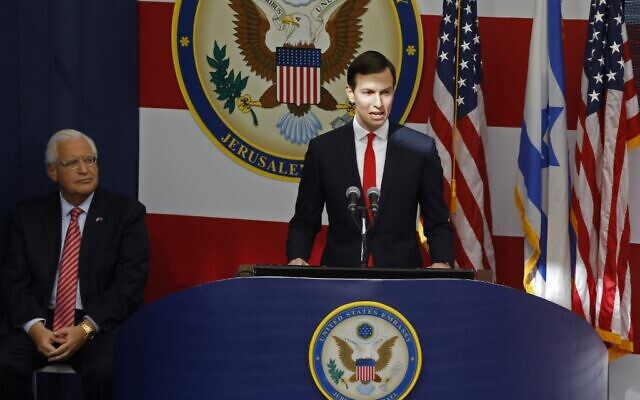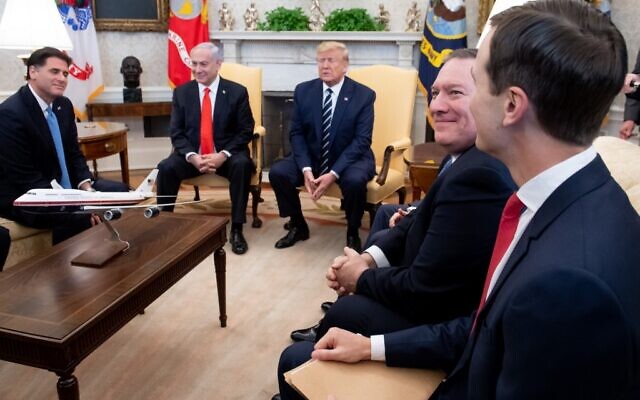T. Belman. Horovitz takes a left wing position believing that what is intended is a negotiated solution. When Gantz says he wants to consult with the international community he is doing likewise. There is only one way that these issues can be resolved and that is through diktat.
Horowitz asks:
Is Trump genuinely seeking to broker the Deal of the Century, or are we, rather, witnessing the Art of No Deal?
That is the question.
Unilateral annexation risks so much damage for such potentially short-term reward, and completely undermines the proposal’s negotiated approach. So who’s pushing it, and why?
A week after the big reveal, something has gone terribly wrong with the Trump administration’s self-styled “Vision to improve the lives of the Palestinian and Israeli people.”
The document published by the White House last Tuesday broke ground in taking seriously many Israeli concerns that were marginalized, if not ignored, in previous peace efforts. Critically, it was predicated on the imperative that the rise of a Palestinian state in no way undermine or threaten Israel’s security, and that the US would only ask Israel to consider compromises that would make the country and its people “more secure in the short and long term.” It also included innumerable elements guaranteed to infuriate the Palestinians — radically constraining their future sovereign rights, denying them significant status in Jerusalem, refusing their demand for a “right of return” for refugees, and plenty more.
But the document was also declaredly only a starting point — “designed for the benefit of Palestinians, Israelis and the region as a whole,” as a recommended basis for direct Israeli-Palestinian negotiation on a “realistic two-state solution.”
As it stated early on, “The role of the United States as facilitator in this process has been to collect ideas from around the world, compile them, and propose a detailed set of recommendations that can realistically and appropriately solve the conflict. The role of the United States is also to work together with other well-meaning countries and organizations to assist the parties in reaching a resolution to the conflict. But only the Israelis and Palestinians themselves can make the decision to forge a lasting peace together,” it stressed (my italics). “The final, specific details of the Israeli-Palestinian Peace Agreement, must be worked out directly between the parties.”
And yet no sooner had the participants in the East Room ceremony dispersed than Trump’s ambassador to Israel, David Friedman, one of the key architects of the plan, was telling reporters that Prime Minister Benjamin Netanyahu could go ahead, right away, and annex the 30% of West Bank territory that the plan allocates to Israel — largely comprising the Jordan Valley and all the settlements — with the further assurance that once Israel had applied its law to those areas, the US would recognize the move.
Why would you unveil a plan, worked on for three years, designed to lead to an agreed-upon deal, carefully calibrated to both reassure Israel and avoid alienating key Arab allies, and then brutally contradict those goals by promising one side all of its spoils right away?
Nowhere in the painstakingly compiled document is a promise made or even implied of any such immediate Israeli annexation. Why would there be? It makes no sense.
Why would you unveil a plan, worked on for three years, designed to lead to an agreed-upon deal, carefully calibrated to both reassure Israel and avoid alienating key Arab allies, and then brutally contradict those goals by promising one side all of its spoils right away?
In US President Donald Trump’s remarks at the ceremony, he did refer to the process by which Israel would gain control of its allocated territory, and did use the word “immediately”: “We will form a joint committee with Israel to convert the conceptual map into a more detailed and calibrated rendering, so that recognition can be immediately achieved,” he said. The sentence was a curious one; how can you “immediately” achieve recognition if you first have to establish a joint America-Israeli committee to turn the broadly drawn maps that accompany the proposal into workable documents?
One might be forgiven for thinking, indeed, that this strange formulation was shoehorned into Trump’s speech at the last moment, especially as three sentences later, Trump made the very same promise of recognition without saying anything about the timing: “And the United States will recognize Israeli sovereignty over the territory that my vision provides to be part of the State of Israel. Very important.”
Jared Kushner has since firmly slapped down the notion of immediate, or even imminent, Israeli annexation. Asked on Wednesday whether the Trump administration would support an immediate decision by Israel to annex the Jordan Valley and West Bank settlements, the president’s peace envoy and son-in-law answered with a firm “No” and elaborated: “We would need an Israeli government in place” before moving forward.
US ambassador to Israel David Friedman listens as senior White House adviser Jared Kushner delivers a speech during the opening of the US embassy in Jerusalem, May 14, 2018. (MENAHEM KAHANA / AFP)
Killing off Arab support
Why does this argument over the timing of annexation matter? Because it goes to the very heart of what the Trump administration is actually seeking to achieve with this plan, this so-long-awaited “deal of the century.”
Is it truly intended to form the basis of “a realistic two-state solution that resolves the risk of Palestinian statehood to Israel’s security,” as the president stated in the East Room last Tuesday? Or is it all just a ruse, calibrated to please Trump’s Greater Land of Israel supporters, ensure Palestinian rejection, and enable Israel’s unilateral annexation of all of the settlements, as soon as possible, to politically benefit Netanyahu?
The document itself, and the thrust of the president’s remarks on Tuesday, strongly point to the former. Friedman’s subsequent briefing, and Netanyahu’s rush to announce that he would indeed be starting the annexation process within days — before Kushner nixed the idea — suggest the latter.
Kushner, the man who said no to Annexation Now, has developed a network of relationships with Arab and Gulf players. Three ambassadors — from the UAE, Oman and Bahrain — were in the East Room for the festive launch, lending explicit Arab legitimacy to the Trump plan. One can only imagine the backlash Kushner has since received from these and other Arab leaders as the prime minister — endorsed by the envoy whom Trump described in his speech as “your ambassador David Friedman” — rushed to try to turn the US Vision into a reality of rapidly expanded Israeli sovereignty.
On the way to January 28, Kushner doubtless had assured his Arab interlocutors that the proposal the administration was about to present provided for a two-state solution with a Palestinian capital in East Jerusalem. Reading the details of the plan, and hearing the Palestinians’ bitter objections to it, might have been enough to guarantee the unanimous Arab League rejection Saturday. But the Netanyahu-Friedman dash for immediate annexation likely killed off any lingering vestiges of support or even tolerance for the US initiative.
A battle royal must now be playing out over unilateral annexation, pitting members of the Trump team against their own colleagues and Netanyahu. The prime minister is reportedly desperate for even a mini-annexation — something, anything, to placate critics on the right to whom immediate annexation was promised and for whom the plan’s very mention of a Palestinian state, however circumscribed, conditional and remote, is anathema. Kushner, who is also the US president’s campaign chief, seems to have the upper hand, for now. (A reporter for Israel’s right-wing Channel 20 tweeted Sunday that Netanyahu’s aides were accusing Kushner of stabbing the prime minister in the back — a report the PM’s office swiftly denied.)
You might think the president’s Evangelical supporters would be urging him to approve the speedy realization of expanded Israeli sovereignty into the West Bank, the better to guarantee, as Trump put it last Tuesday, that “our majestic biblical heritage will be able to live, breathe, and flourish in modern times.” But one of the most prominent of those supporters, Mike Evans, who was in attendance that day, is notably counseling patience.
Mike Evans at the Friends of Zion Museum in Jerusalem, on May 16, 2017 (Nati Shohat/Flash90)
“I would not encourage them [the Israeli right] to pressure the president on annexation,” said Evans in an Israel Radio interview on Monday. “You have an opportunity now that you never had before. You don’t want to undermine your strength in the Gulf Sunni states. Israel never had Arab leaders supporting a peace initiative like this. This is historic. Everyone needs to be grateful and just relax.” Quick, unilateral annexation “is not something that they need to do immediately, because there is nothing to worry about with Donald Trump,” Evans elaborated. “All the anxiety I’m hearing from Israel concerning the people who are upset about the plan – they need to relax and be patient.”
Good for Bibi, bad for Israel
Apart from boosting Netanyahu’s short-term political prospects ahead of the March 2 elections, it is hard to see what Israel has to gain by a rush to annexation, as opposed to the negotiated approach that the deal itself advocates. And if Evangelical leaders like Evans see no hurry, and thus are not opposing Trump domestically on this, it is hard to see what the Trump administration has to gain either.
And there is a great deal to lose.
Annexing now, in the absence of a negotiated agreement, Israel, with US backing, would be creating a reality in which two peoples are living side by side with formalized unequal rights — a situation that would be hugely damaging to Israel’s international status and reputation. (I cannot bring myself to type the A word.)
The move would likely put the Jordan peace treaty at risk, fuel West Bank chaos and violence, and boost the BDS movement. It might well prompt a rush of European nations to recognize Palestine. It might even prompt Democratic presidential candidates to recognize Palestine.
Annexing now, in the absence of a negotiated agreement, Israel, with US backing, would be creating a reality in which two peoples are living side by side with formalized unequal rights — a situation that would be hugely damaging to Israel’s international status and reputation. (I cannot bring myself to type the A word.)
The Netanyahu government has already burned almost all of its bridges with the Democrats. It was striking, if unsurprising, that there were apparently no Democratic lawmakers in the East Room last Tuesday, and that Netanyahu is not known to even have met with any Democratic lawmakers in the course of his visit.
Israel had always recognized the imperative of maintaining bipartisan support across the US political mainstream; Netanyahu’s commitment to that imperative has, in recent years, descended to mere lip service. Administration-backed unilateral annexation would truly turn Israel, under its current leadership, into an issue of bitter partisan conflict.
In this photo taken on January 27, 2020, US President Donald Trump meets with Israeli Prime Minister Benjamin Netanyahu alongside Israeli Ambassador to the US Ron Dermer (L), US Secretary of State Mike Pompeo (2nd R), White House adviser Jared Kushner (R) in the Oval Office of the White House in Washington, DC. (SAUL LOEB / AFP)
Then there’s the not insignificant matter of Israel’s relationship with American Jewry, whose very survival is founded on the notions of respect for minorities, equal rights, coexistence — ideals Israel would be seen to be repudiating with an annexation power move.
Diplomatic-security achievements that truly advance Israel’s interests are those that stand the test of time, not those that, as would be the case here, would not survive the pendulum swings of US politics
Why risk so much long-term damage and punishment for such potentially short-term reward? US recognition for unilateral Israeli annexation, after all, could simply be reversed by a new administration in a year or five.
Diplomatic-security achievements that truly advance Israel’s interests are those that stand the test of time, not those, as would be the case here, that do not survive the pendulum swings of US politics.
Deal or no deal?
The Obama administration approach to Israeli-Palestinian peacemaking was fatally misconceived. Focused on dragging the intransigent Palestinians to a deal, the Obama team thoroughly underestimated Israel’s security needs, even though the horrors of the Second Intifada were still fresh. The Trump administration has made no such mistake.
Much of the plan unveiled last week is laudable in its stated intent — from an Israeli and a Palestinian perspective. “It is time to help the Palestinians achieve a hopeful and prosperous future and enable them to join the community of nations,” it states. Who can argue with that?
Other sections sit less well, and prompt questions as to why they are included. Is the clause contemplating the remarcation of Arab towns and villages near the pre-1967 lines in northern Israel, so that they become part of a future Palestine, truly considered a potential element in a negotiated deal? Or was it included at the prime minister’s instigation as an attempt to appease Yisrael Beytenu leader Avigdor Liberman, who has long advocated such a policy, and whose support in the last two elections would have given Netanyahu a majority? Why risk igniting Muslim fears with a nod toward possible Jewish prayer atop the Temple Mount? Was the provision for a strip of Palestine in what is today’s southern Israel, extending from Gaza far, far south along the Israeli-Egyptian border, thoroughly discussed with the Israeli and Egyptian forces that would need to secure it?
But these and all the other issues of contention could potentially be debated in the Israeli-Palestinian negotiation that the document itself seeks to facilitate. It is the question of whether the US is going to allow one side and one side only, Israel, to quickly implement its intended benefits under the proposed deal that overshadows all other aspects of the deal’s credibility.
In short, is Trump genuinely seeking to broker the Deal of the Century, or are we, rather, witnessing the Art of No Deal?
For what it’s worth, I happen to believe the former.
If so, the US president and those who support that admirable goal should be asking: Who is working to subvert it?






Leave a Reply
You must be logged in to post a comment.